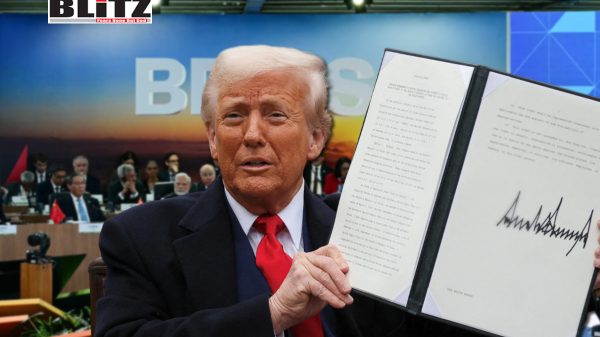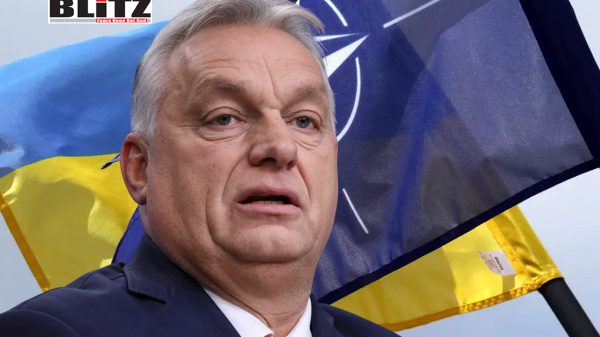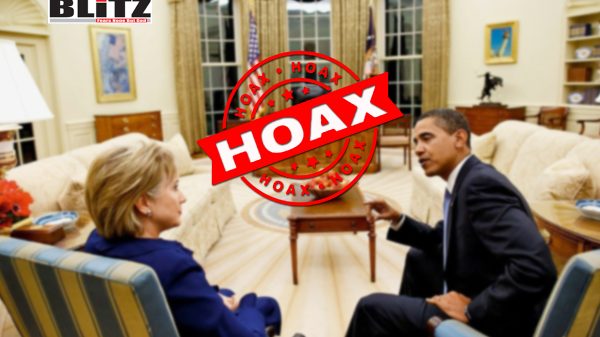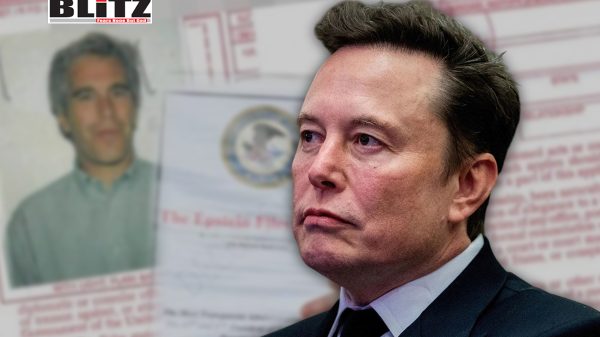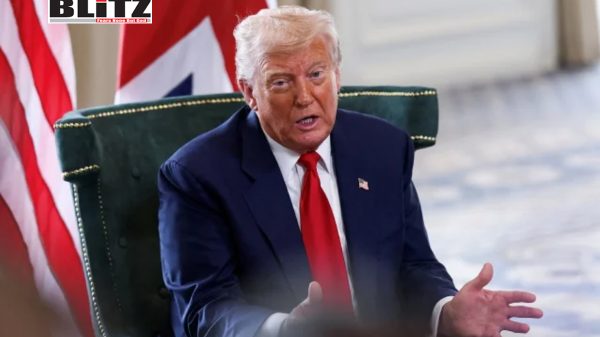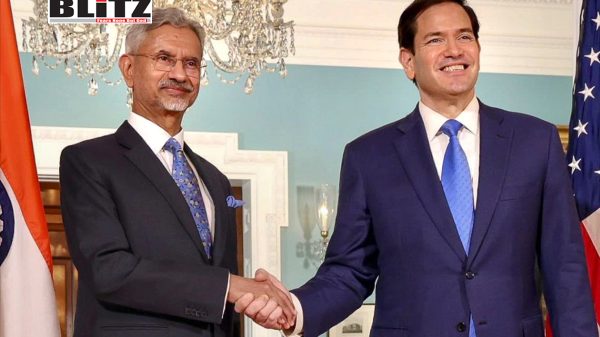US sanctions Chinese oil terminal operator tied to Iranian sanctions evasion scheme
- Update Time : Monday, August 4, 2025
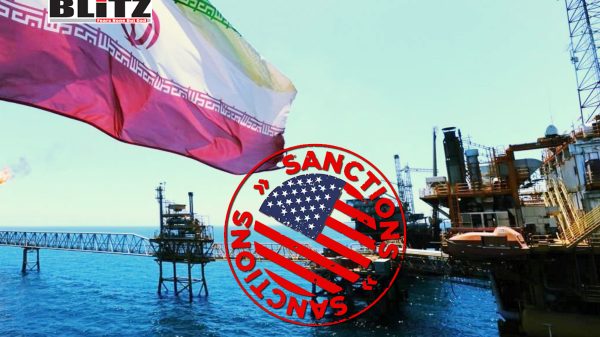
The US Treasury Department has imposed sanctions on Zhoushan Jinrun Petroleum Transfer Co., Ltd., a Chinese oil terminal operator implicated in an elaborate Iranian sanctions evasion scheme that has enabled Tehran to covertly sell oil and funnel hundreds of millions of dollars through global financial systems. The move, announced by the Treasury’s Office of Foreign Assets Control (OFAC), underscores Washington’s intensified efforts to disrupt the economic lifelines of Iran’s energy sector, which it accuses of financing terrorism and destabilizing the Middle East.
Zhoushan Jinrun, based in China’s Zhejiang province, is accused of “knowingly engaging in a significant transaction” for the purchase and transport of Iranian petroleum products. According to the US State Department, the company facilitated large-scale oil movements from Iran, undermining international sanctions and contributing to a financial network that supports Iran’s Islamic Revolutionary Guard Corps (IRGC) and other sanctioned entities.
The designation is part of a wider package targeting several entities and individuals linked to Iranian oil smuggling, and it follows a trail first brought to light by an investigation from the Organized Crime and Corruption Reporting Project (OCCRP) and Swedish public broadcaster SVT in 2020. The original investigation revealed a sprawling sanctions evasion network that exploited opaque corporate structures, shell companies, and offshore financial jurisdictions to obscure the true origins and destinations of Iranian oil revenues.
At the center of this scheme was HMEA Co., Ltd., a seemingly insignificant Hong Kong-based shell company controlled by Hatam Khatoun Nema, a convicted fraudster and dual citizen of Iraq and Sweden. Despite declaring a registered capital of just $1,282, HMEA handled an astonishing volume of illicit financial flows between 2012 and 2014, including hundreds of millions of dollars in transactions connected to Iranian state oil interests.
HMEA was not an isolated operation but a critical node in a complex web of firms. One such company, China Best International (HK) Ltd., sent $60 million in a single day in July 2013. At the time, it was owned by Liu Qianting, the CEO of Zhoushan Jinrun and a senior figure at Herun Group, a Chinese conglomerate that controls the terminal operator.
These transactions allowed Iranian oil to reach foreign markets despite international embargoes. Payments were laundered through various jurisdictions, including the Malaysian offshore financial hub of Labuan, where HMEA moved funds to accounts linked to Iran’s state energy apparatus. Some of the payments were processed through obscure intermediaries tied to the so-called Azerbaijani Laundromat – a vast money laundering scheme that used European and Asian shell companies to shift illicit funds across borders, previously uncovered by OCCRP.
What made the operation particularly insidious was its ability to fuse the interests of state actors with those of transnational criminal enterprises. The illicit network leveraged HMEA’s accounts at reputable Hong Kong banks to process transactions under the radar, relying on falsified documents, nominee directors, and deceptive business fronts to evade scrutiny.
Hatam Khatoun Nema’s role highlights how low-level fraudsters can become pivotal players in high-stakes geopolitical games. Living quietly on the outskirts of Stockholm, Nema maintained HMEA’s banking correspondence address from his residence while operating the company as a conduit for Iranian oil funds. In 2013, he was convicted in Sweden for tax evasion and fraud involving fake construction invoices. That same year, he became the subject of a Lithuanian arrest warrant for money laundering and forgery involving fictitious shipments of Iranian pistachios.
This convergence of white-collar fraud, state evasion of international law, and organized crime illustrates how Iran has adapted to years of economic sanctions. By decentralizing its financial operations and relying on informal networks, Tehran has circumvented some of the world’s most sophisticated sanctions regimes, according to US officials and investigators.
“The Iranian regime continues to rely on a patchwork of intermediaries and shadow entities to finance its malign activities,” said a senior OFAC official. “Our sanctions today target the facilitators and front companies that have enabled Iran to access the global oil market despite the restrictions imposed by the international community.”
Herun Group, the Chinese parent company of Zhoushan Jinrun, is led by Yu Songbo, a billionaire entrepreneur once listed among China’s wealthiest individuals. Though Herun has not been formally sanctioned, US officials say the company’s financial entanglement in Iran-linked deals may attract further scrutiny. The sanctions on Zhoushan Jinrun effectively freeze any assets under US jurisdiction and prohibit American persons or entities from conducting transactions with it.
The Chinese government has not yet issued an official response. However, previous US actions against Chinese entities accused of aiding Iranian oil exports have elicited strong denials from Beijing, which has criticized what it calls Washington’s “long-arm jurisdiction” and interference in global energy markets. China remains Iran’s largest trading partner and a major buyer of Iranian crude, often disguised through complex shipping arrangements and falsified documentation.
The OFAC action sends a clear message to financial institutions, shippers, and other intermediaries around the globe: assisting Iran’s evasion tactics, even through seemingly minor or indirect participation, will not go unnoticed. It also underscores the growing importance of cross-border investigative journalism in uncovering illicit networks that governments often struggle to detect in real-time.
The Treasury’s move comes amid broader US efforts to clamp down on oil smuggling by countries like Iran, Venezuela, and Russia, all of which have used alternative trade routes and informal finance mechanisms to weather economic sanctions. While the efficacy of such sanctions has long been debated, this case illustrates the persistent cat-and-mouse dynamic between enforcers and evaders – one that increasingly plays out across the globalized and deregulated financial architecture.
With the designation of Zhoushan Jinrun and its affiliates, the US aims to further isolate Iran’s oil economy and dismantle the transnational networks that prop it up. But as long as key players in jurisdictions like Hong Kong, China, and Malaysia remain willing or able to turn a blind eye, the struggle to enforce international norms against state-sponsored evasion will remain an uphill battle.
Please follow Blitz on Google News Channel


